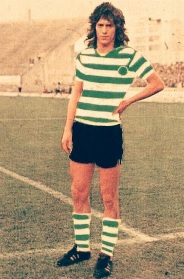 In an astonishing turn of events, Benfica's longest-serving post-war coach and the man who has just guided the Eagles to their first back-to-back championship triumph in over three decades, Jorge Jesus, has left the club for fierce cross-town rivals Sporting.
In an astonishing turn of events, Benfica's longest-serving post-war coach and the man who has just guided the Eagles to their first back-to-back championship triumph in over three decades, Jorge Jesus, has left the club for fierce cross-town rivals Sporting.
At least that's what every Portuguese media outlet is reporting, although nothing has yet been confirmed officially.
Jesus, a former Sporting player, is reported to have been lured by a €6million/season salary over three years, while Vitória Guimarães coach Rui Vitória is set to take over at Benfica.
Rumours had been rumbling for several weeks that the Benfica coach could make the short 1-kilometre trip across to the other side of Lisbon's Segunda Circular (ring-road), but most observers of Portuguese football put it down to little more than silly season speculation.
It appears that Benfica president Luís Filipe Vieira was also convinced Sporting would not have the financial capacity to prise JJ away from the Estádio da Luz. That is the only plausible explanation for offering the 60-year-old coach a new contract in which his salary was significantly reduced. With FC Porto, who have long been linked with a swoop for Jesus, having confirmed that Spanish coach Julen Lopetegui would remain at the Dragons, Vieira no doubt thought Jesus would eventually put pen to paper on a new more modest deal.
African backing
However, Sporting came up with a huge offer in financial terms, having secured funds from backers from Angola (a former Portuguese colony with strong links to Portugal) and Equitorial Guinea. According to these reports, Jorge Jesus has the possibility of earning €18 million in three years at the Alvalade.
Beyond the financial considerations, the coach made several demands that president Bruno de Carvalho accepted, namely that he will oversee the whole football structure of the club, and crucially that none of Sporting's best players will leave this summer: Rui Patrício, William Carvalho, André Carrillo, João Mário and Islam Slimani provide a solid basis on which to construct the team.
Given Jesus's system of play in which the holding midfielder is arguably the team's key player, it is especially vital that William stays. The player himself is likely to be more willing to remain at Sporting given the way Jesus improved the likes of Javi Garcia, Nemanja Matic and Enzo Pérez, facilitating huge-money transfers further down the line.
Academy conundrum
On the other side of the coin, Sporting have long been known for fielding players produced at their famed Alcochete academy, and Jesus's reluctance to put his faith in Portuguese youngsters was his biggest criticism during his Benfica years. How will these two opposing philosophies be conciliated?
Another strong motivation for Jesus, who never tires of championing his own coaching merits, will be to try and prove that Benfica won chiefly because of him, and not the club structure, and he can do a similar job in the green half of the city. Should he lead Sporting to championship success, he will go down in history as one of the greatest ever Portuguese coaches.
As for Benfica, the early indications are that Luís Filipe Vieira will be facing a backlash for letting Jesus go. The coach has revolutionised Benfica over his six years at the club, winning 3 Primeira Liga titles, 10 trophies in total, and enabling a series of transfer windfalls to flow into the club's coffers, despite losing his best players year after year.
New man, new philosophy at the Luz?
However, the president has constantly said he wants Benfica to shift its focus as a club to include more home-grown players, and given the success of Rui Vitória in that department at Vitória Guimarães, and the brilliant talents recently produced at the Seixal Academy, Vieria may yet have the last laugh.
Vitória trained Benfica's youth squad earlier in his coaching career. He accepted the Vitória Guimarães job despite the club being in a precarious position from the financial point of view, having to rely on youth products and players plucked from the lower leagues.
Under these conditions he has enjoyed tremendous success, keeping the northerners near the top of the table and in 2013 leading the team to its first major trophy, winning the Portuguese Cup, ironically beating Benfica in the final.
The season has only just finished but given this backdrop the 2015/16 season promises to make for fascinating viewing in Portugal.

